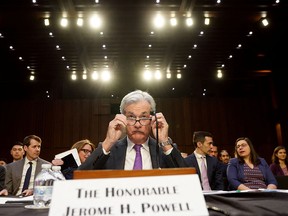Washington — The Federal Reserve will likely need to raise interest rates more than expected in response to recent strong data and is prepared to move in larger steps if the ‘totality’ of incoming information suggests tougher measures are needed to control inflation.
Fed Chair Jerome Powell’s Testimony
In his testimony before the Senate Banking Committee, Fed Chair Jerome Powell acknowledged that the latest economic data have come in stronger than expected, which suggests that the ultimate level of interest rates is likely to be higher than previously anticipated. This sentiment was echoed in prepared remarks for the hearing, where Powell noted:
‘The totality of the data were to indicate that faster tightening is warranted, we would be prepared to increase the pace of rate hikes.’
Powell’s comments mark a stark acknowledgment that a ‘disinflationary process’ he spoke of repeatedly in a Feb. 1 news conference may not be so smooth.
Strong Economic Data and Inflation Concerns
The remarks came after the U.S. government reported an unusually large increase in payroll jobs for January, with some of that unexpected economic strength possibly due to warm weather and other seasonal effects. Powell noted, however, that the Fed was cognizant it may also be a sign the U.S. central bank needs to do more to temper inflation.
Labour Market and Inflation
Although inflation ‘has been moderating’ since its peak last year, Powell said:
‘The process of getting inflation back down to 2 per cent has a long way to go and is likely to be bumpy.’
Members of the Senate Banking Committee will question Powell after he delivers his testimony, with a similar hearing scheduled before the House of Representatives Financial Services Committee on Wednesday.
Possible Labour Market Softening
Powell’s testimony also touched on an issue now at the centre of Fed discussion as officials weigh whether recent data will prove to be a ‘blip,’ as one of his colleagues suggested, or be seen as evidence the central bank needs to lean on the economy even harder than currently expected.
In his testimony, Powell noted that much of the impact of the central bank’s monetary policy may still be in the pipeline, with the labour market still sustaining a 3.4 per cent unemployment rate not seen since 1969, and strong wage gains.
Labour Market Conditions
Powell suggested that the labour market might have to weaken for inflation to fall across the broad services sector, a labour-intensive part of the economy where prices continue to rise:
‘To restore price stability, we will need to see lower inflation in this sector, and there will very likely be some softening in labour market conditions.’
Powell’s last monetary policy report to Congress was in June, which was early in what became the most aggressive cycle of Fed rate increases since the 1980s. That monetary tightening has driven up borrowing costs for home mortgages, a topic of particular sensitivity for elected officials, contributed to volatility in traditional equity markets as well as alternative assets like cryptocurrencies, and sparked some broader debates about the Fed’s efficacy.
Inflation Rate
Inflation has fallen since Powell’s last appearances in Congress. After topping out at an annual rate of 9.1 per cent in June, the Consumer Price Index dropped to 6.4 per cent in January; the separate Personal Consumption Expenditures price index, which the Fed uses as the basis for its 2 per cent target, peaked at 7 per cent in June and had fallen to 5.4 per cent as of January.
Reaction
Powell’s testimony marked a significant shift in tone from his previous appearances before Congress, where he emphasized the need for patience and caution in addressing inflation concerns. The comments are likely to be seen as a signal that the Fed is preparing to take more aggressive action to bring down inflation, which could have significant implications for the economy.
Conclusion
The Fed’s decision-making process is highly influenced by economic data, and Powell’s testimony suggests that recent strong data may require a more forceful response. As policymakers weigh the impact of monetary policy on the labour market and inflation, the prospects for future interest rate decisions become increasingly uncertain.
The central bank’s ability to balance competing demands from various stakeholders will be crucial in shaping the course of economic policy. With inflation concerns still lingering, Powell’s remarks offer a glimpse into the complex decision-making process at the Fed and its efforts to manage the economy amidst ongoing uncertainty.



